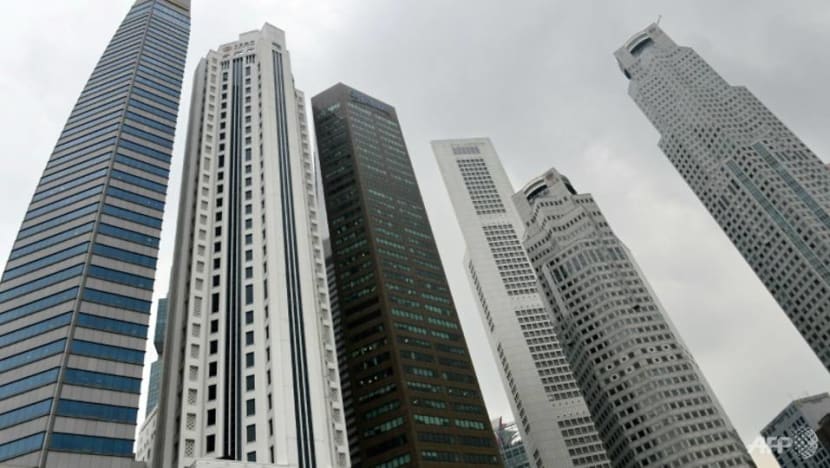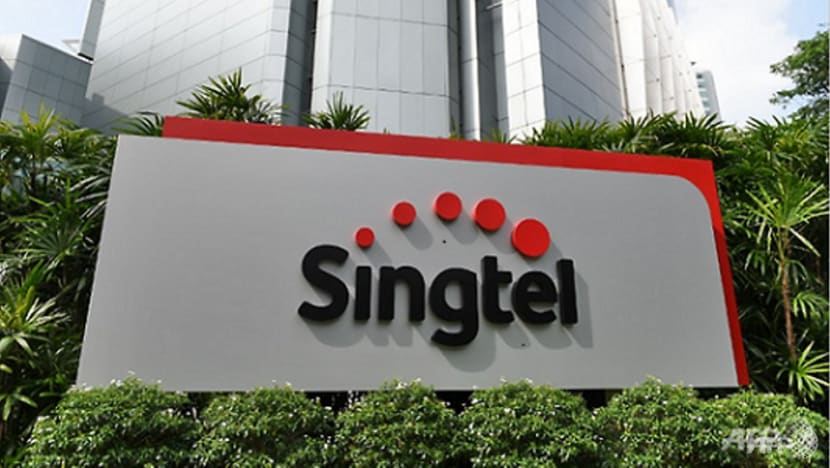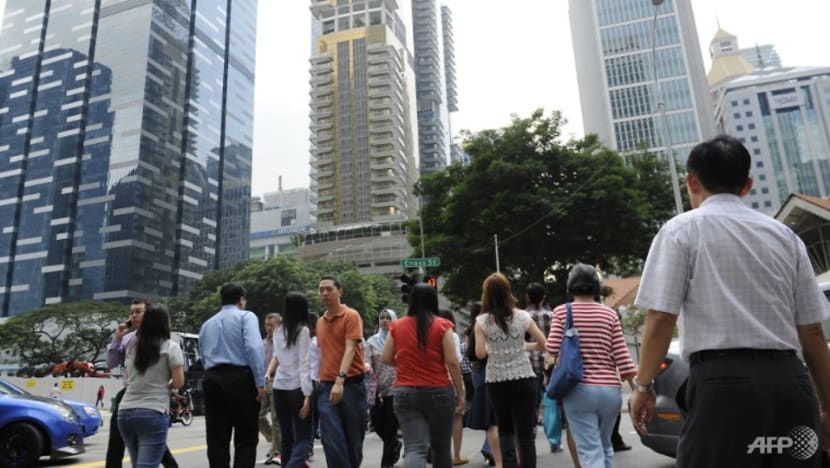commentary Singapore
Commentary: Who's responsible for combating corruption in Singapore?
With the recent spate of news of individuals on the frontlines being charged for corruption, Madeline Ong from Singapore Management University’s Lee Kong Chian School of Business discusses the key ingredients needed in working toward a goal of zero corruption.

File photo of handcuffs.
SINGAPORE: Singapore is recognised around the world for its zero-tolerance stance on bribery and corruption. The country is the only Asian country to have consistently ranked among the top ten least corrupt countries in the world, according to Transparency International’s Corruption Perceptions Index.
Most notably, in 2016, Singapore rose to the 7th position on this list, ahead of the Netherlands, Canada and Germany.
Singapore’s outstanding performance on such corruption indexes can be largely attributed to its stringent laws, such as the Prevention of Corruption Act, and strict enforcement by regulatory bodies such as the Corrupt Practices Investigation Bureau (CPIB).
Yet, there has been an unusual spate of news about individuals on the frontlines accepting bribes in exchange for favours. Two weeks ago, an immigration officer was charged for accepting bribes in exchange for granting social visit passes.
Just this past week, a former senior procurement officer at Keppel Shipyard was charged with almost 400 counts of corruption, in accepting bribes in exchange for helping companies further their business interests with the shipyard among other charges.
Recent cases signal a shift from the more major, high-profile incidents of corruption in previous years involving high-ranking officials from government agencies.
In 2013, Singapore’s Civil Defence Force chief was convicted for receiving sexual favours in exchange for business contracts. In 2014, a former assistant director of the CPIB was jailed for 10 years for misappropriating S$1.76 million.
Although recent cases seem relatively less severe, given the lower sums of money involved and the junior positions these offenders hold, they suggest that Singapore’s present legal and regulatory framework is inadequate for deterring and ending bribery and corruption.
One case of corruption is one case too many.
Admittedly, it might not be realistic to expect zero corruption altogether. Therefore, a key marker of success in this endeavour is whether strong checks and balance are in place to address corruption, reduce corresponding risks and build a culture of strong ethics.

COMPANIES MAY NOT BE DOING ENOUGH
Researchers who study unethical behaviour have found that the prevalence of corruption can be attributed to an interaction of factors at the individual-, company- and country-level.
Although Singapore has robust country-wide laws for eradicating corruption, it may still be the case that some companies in Singapore are not doing enough to ensure a corruption-free work environment, and that Singaporeans themselves are not doing enough to overcome the psychological temptations of engaging in unethical behaviour.
Companies can influence corruption through the work environment they create, which shapes the actions of their employees.
For example, Singtel is recognised for its zero-tolerance policy towards fraud and corruption. Employees’ failure to comply with an ethical code of conduct can lead to disciplinary action, including termination, as well as the company pressing charges.
Singtel also has an independent whistle-blowing hotline, operated by an external service provider, which allows employees to report incidents of improper conduct.
The company has gone to great pains to educate their staff, through making it mandatory for all new employees to attend a fraud awareness training programme to help them internalise the company’s culture of ethics.
Singtel’s efforts may be bearing fruit. The company has consistently appeared on the US-based Ethisphere Institute’s annual list of the World’s Most Ethical Companies for several years.

In contrast, other companies may pay little to no attention to such ethics policies or codes of conduct. Employees are not punished for engaging in unethical activities, simply because these activities don’t meet the threshold in qualifying as a case of corruption.
Sometimes, staff may even be commended if their actions, while questionable, result in beneficial outcomes for the company - for instance, in securing a business deal or achieving superior sales performance.
In some cases, well-meaning employees who report unethical activities are ostracised, blacklisted or even fired, suggesting that the company’s efforts to carry out ethics training programmes and put in place other anti-corruption measures are mere lip service.
When companies do not pay close attention to their ethical culture, they risk becoming embroiled in a company-wide ethical scandal, which can damage their reputation and relationships with customers for many years.
Globally, there has been a number of widely publicised incidents in the past few years, including Wells Fargo’s account fraud scandal, which saw the creation of millions of savings and checking accounts for clients without their consent, and the Volkswagen scandal where manufacturers intentionally programmed diesel engines to activate some emissions controls only during laboratory emissions testing.
Fortunately, we have yet to witness any major company-wide scandals in Singapore in recent years.
LEADERS ARE ROLE MODELS
Leaders of organisations are also responsible, not just in ensuring that ethics policies and codes are in place, but also in role-modelling ethical behaviour to their fellow employees.
In a paper published last year, my co-authors and I found that employees expect their leaders to take a principled stand against ethically questionable activities to help prevent such activities from arising, and that leaders who do not uphold such principles are often viewed negatively.
In another recently published paper, my co-authors and I found that if higher-ranking individuals in a company get away with unethical behaviour, other lower-ranking employees may expect to escape unscathed and go on to engage in similarly questionable acts, allowing bad behaviour to take root and spread rapidly through the organisation.
Indeed, leaders play a key role in creating, maintaining and changing the ethical culture of the organisations they lead.

Singapore’s founding Prime Minister Lee Kuan Yew was very clear in his stand that a clean and incorruptible core leadership is essential for corruption to be stamped out.
In building up the Singapore Government, he stated an expressed expectation for leaders to uphold the highest moral standards, and for those who engaged in unethical behaviours to be harshly disciplined. This created and maintained a culture of zero tolerance towards corruption in the Singapore government.
Today, Prime Minister Lee Hsien Loong continues to emphasise the need for leaders in the Singapore Government to uphold high levels of integrity.
BUT INDIVIDUALS BEAR ULTIMATE RESPONSIBILITY
Regardless of the laws of one’s country, or the ethical culture of one’s organisation, each individual person ultimately bears personal responsibility for his or her decision to engage in an unethical act or not.
Although most people hope to do good and be good, research in psychology has documented several cognitive processes that people engage in to rationalise or excuse their own bad behaviour.
Some try to reframe their actions in more palatable, morally acceptable terms. Officers who accept bribes may rationalise their behaviour by telling themselves that they need the money to support their family, or that it is just a small sum of money compared to other more serious cases of bribery committed by others.
Others try to shift the blame for the unethical behaviour to other parties or individuals. For example, a man who chooses to receive sex favours in exchange for business favours might blame the other party for making unwanted sexual advances and pressuring him into misbehaving, rather than take personal responsibility for accepting those sexual favours.
Through engaging in such mental gymnastics, individuals are able to commit unethical behaviour without feeling like they are bad people.
So it seems that although Singapore strictly enforces laws about bribery and corruption, laws alone are not enough.
Individuals can easily succumb to the temptation of engaging in unethical behaviour for personal pleasure or gain. Companies too, may over-emphasise financial performance and success, ignoring whether codes of ethics are adhered to or whether checks and balances are implemented and followed.
Fortunately, corruption in Singapore is not a systemic problem; it is still limited to isolated cases.
Moving forward, Singapore should continue to maintain a tough stance against corruption at the nation-level, while companies focus on building a culture of ethics and individuals strive to uphold the high moral standards they should set for themselves.
Madeline Ong is assistant professor of organisational behaviour and human resources at the Singapore Management University’s Lee Kong Chian School of Business.















